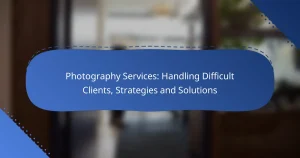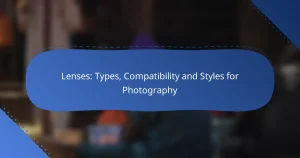Photography services play a crucial role in mastering the art of visual storytelling, encompassing various genres such as commercial, event, portrait, documentary, and real estate photography. Each type requires specialized skills to effectively convey unique narratives through images. When selecting a photography service, it's essential to consider the provider's portfolio, client feedback, and pricing to ensure you find the right fit for your needs.
Photography Services: Trust Building, Transparency and Pricing
In the realm of photography services, building trust with clients is essential for a successful engagement. By showcasing professionalism and transparency through client testimonials, a strong portfolio, and clear pricing…
Tripods: Stability, Height and Weight Capacity for Landscape Photography
When selecting a tripod for landscape photography, stability, height, and weight capacity are crucial factors to consider. A sturdy tripod provides a solid base that resists vibrations and adapts to…
Photography Services: Handling Difficult Clients, Strategies and Solutions
In the world of photography services, managing difficult clients requires a blend of clear communication and proactive strategies. By setting expectations and addressing concerns promptly, photographers can transform challenging interactions…
Photoshop vs Lightroom: Which Is Better and When to Use
Choosing between Photoshop and Lightroom can significantly impact your photography workflow. Photoshop excels in detailed editing and advanced retouching, while Lightroom offers powerful tools for managing and organizing large collections…
Cameras: Features, Ease of Use and Price for Beginners
Choosing the right camera as a beginner involves balancing user-friendly features, affordability, and versatility. The best beginner cameras not only help you grasp the fundamentals of photography but also deliver…
Color Correction: Techniques, Tools and Impact on Product Photography
Color correction is a vital aspect of product photography, ensuring that images accurately reflect the true colors of the products. By employing effective techniques and utilizing specialized tools, photographers can…
Photography Services: Communication, Satisfaction and Client Retention
Effective communication is essential in photography services, as it establishes trust and ensures clients feel valued throughout their experience. By delivering high-quality work and responsive customer service, photographers can significantly…
Photography Portfolio: Design, Showcase and Client Attraction
Creating a captivating photography portfolio is essential for attracting clients and showcasing your unique style. By focusing on a clean design, high-quality images, and client testimonials, you can effectively engage…
Virtual Reality: Experiences, Engagement and Future Trends
Virtual Reality (VR) is revolutionizing the way we engage with digital content by offering immersive experiences that captivate users and foster active participation. From gaming and virtual travel to educational…
Lightroom for Wedding Photos: Enhancements, Presets and Workflow
Lightroom is an essential tool for wedding photographers, offering advanced features for editing, organizing, and sharing images. With its capabilities in color correction and creative effects, photographers can enhance their…
What are the best photography services for visual storytelling?
The best photography services for visual storytelling include commercial, event, portrait, documentary, and real estate photography. Each type serves a unique purpose and requires specific skills to effectively convey narratives through images.
Commercial photography
Commercial photography focuses on creating images for commercial use, such as advertisements, product catalogs, and corporate branding. It aims to showcase products or services in a way that attracts customers and enhances brand identity.
When hiring a commercial photographer, consider their portfolio to ensure their style aligns with your brand's vision. High-quality images can significantly impact consumer perception and drive sales, so investing in professional services is crucial.
Event photography
Event photography captures moments from various occasions, including weddings, corporate events, and parties. The goal is to document the atmosphere and emotions of the event, providing lasting memories for clients.
For successful event photography, communicate your expectations clearly with the photographer. Discuss key moments you want captured and any specific styles you prefer. A good event photographer should be adaptable and able to work in diverse lighting conditions.
Portrait photography
Portrait photography focuses on capturing the personality and mood of individuals or groups. This type of photography can be used for personal branding, family portraits, or professional headshots.
When planning a portrait session, consider the location, lighting, and poses that best reflect the subject's character. A skilled portrait photographer will guide subjects to create natural expressions and flattering compositions.
Documentary photography
Documentary photography tells stories through images, often focusing on real-life events and social issues. This style aims to capture authentic moments without staging, providing a raw and honest perspective.
Choosing a documentary photographer involves looking for someone with a strong narrative style and the ability to blend into the background. Their work should evoke emotions and provoke thought, making it impactful and memorable.
Real estate photography
Real estate photography showcases properties for sale or rent, highlighting their best features to attract potential buyers or renters. High-quality images can significantly enhance online listings and marketing materials.
When hiring a real estate photographer, ensure they understand how to use lighting and angles to make spaces look inviting. Consider including aerial shots or virtual tours to provide a comprehensive view of the property, which can be particularly effective in competitive markets.
How to choose a photography service?
Choosing a photography service involves evaluating several key factors to ensure you find a provider that meets your needs. Focus on their portfolio, client feedback, and pricing to make an informed decision.
Evaluate portfolio quality
Start by reviewing the photographer's portfolio to assess their style and expertise. Look for consistency in quality and a range of work that aligns with your vision, whether it’s weddings, portraits, or commercial photography.
Consider how well their previous projects resonate with you. A strong portfolio should showcase not only technical skills but also creativity and storytelling ability. If possible, ask for full galleries instead of just highlights to get a better sense of their work.
Consider client reviews
Client reviews provide insight into the photographer's reliability and professionalism. Look for testimonials on their website and third-party platforms to gauge overall satisfaction and any recurring themes in feedback.
Pay attention to comments regarding communication, punctuality, and the final product. A photographer with consistently positive reviews is more likely to deliver a satisfactory experience and outcome.
Assess pricing structures
Understanding the pricing structures of photography services is crucial for budgeting. Prices can vary widely based on experience, location, and the complexity of the shoot, often ranging from a few hundred to several thousand dollars.
Inquire about what is included in the packages, such as the number of edited photos, prints, or additional services like albums. Be wary of hidden fees and ensure you have a clear agreement on costs before committing.
What are the costs of photography services?
The costs of photography services can vary significantly based on factors such as the photographer's experience, the type of photography, and the specific services offered. Understanding these elements will help you budget effectively for your photography needs.
Hourly rates
Hourly rates for photography services typically range from $50 to $300, depending on the photographer's expertise and the complexity of the shoot. Newer photographers may charge lower rates, while seasoned professionals often command higher fees due to their experience and portfolio.
When hiring a photographer on an hourly basis, consider the total time needed for the shoot, including setup and any post-processing work. It's wise to discuss the expected duration upfront to avoid unexpected costs.
Package pricing
Many photographers offer package pricing, which can provide better value for clients needing multiple services. Packages may include a set number of hours, edited images, prints, or even albums, often priced between $500 and $3,000 depending on the inclusions.
When evaluating package options, assess what each package includes and if it aligns with your needs. Some packages may offer discounts for larger bookings, such as weddings or corporate events, making them more economical.
Location-based pricing
Location can significantly influence photography costs, as travel expenses may be added to the base fee. Photographers in urban areas often charge more due to higher living costs, while those in rural regions may have lower rates.
When hiring a photographer, inquire about any travel fees if the shoot is outside their local area. Some photographers may include a certain distance in their base rate, while others will charge extra for longer distances, so clarify this beforehand to avoid surprises.
What equipment do professional photographers use?
Professional photographers utilize a range of specialized equipment to capture high-quality images. Key items include cameras, lenses, lighting gear, and editing software, each playing a crucial role in the photography process.
Cameras and lenses
Cameras are the backbone of any photography setup, with options ranging from DSLRs to mirrorless systems. Professional photographers often choose full-frame sensors for better image quality and low-light performance.
Lenses are equally important, as they determine the perspective and depth of field in images. A variety of lenses, such as prime, zoom, and specialty lenses, allow photographers to achieve different effects and compositions. Investing in high-quality glass can significantly enhance the final output.
Lighting equipment
Lighting equipment is essential for controlling exposure and mood in photography. Many professionals use external flash units, softboxes, and reflectors to manipulate light effectively.
Natural light can also be harnessed, but having artificial lighting options ensures versatility in various shooting conditions. Understanding the characteristics of light, such as color temperature and intensity, helps photographers create the desired atmosphere in their images.
Editing software
Post-processing is a vital step in photography, and professional photographers rely on advanced editing software to refine their images. Programs like Adobe Lightroom and Photoshop are industry standards, offering tools for color correction, retouching, and compositing.
When selecting editing software, consider factors such as ease of use, available features, and compatibility with your camera's file formats. Regularly updating your skills in these programs can greatly enhance the quality of your final images.
What are the benefits of hiring a professional photographer?
Hiring a professional photographer offers numerous advantages, including access to high-quality images and expertise in visual storytelling. These benefits can significantly enhance the impact of your visual content, whether for personal or business purposes.
High-quality images
Professional photographers use advanced equipment and techniques to capture high-quality images that stand out. They understand lighting, composition, and editing, which results in photos that are sharp, vibrant, and visually appealing.
Investing in high-quality images can elevate your brand's image or preserve cherished memories. For instance, a professional portrait can enhance your online presence, while high-resolution event photos can be used for marketing materials.
Expertise in storytelling
Professional photographers excel in storytelling through their images, capturing emotions and narratives that resonate with viewers. They know how to frame shots and choose moments that convey a message or theme effectively.
This storytelling ability can be particularly beneficial for businesses looking to connect with their audience. For example, a photographer can create a series of images that illustrate a brand's journey, helping to build a deeper connection with potential customers.
Time-saving for clients
Hiring a professional photographer saves clients time and effort in planning and executing a photoshoot. Professionals handle everything from concept development to post-processing, allowing clients to focus on other important tasks.
Additionally, experienced photographers work efficiently, often completing shoots in a fraction of the time it would take an amateur. This efficiency can be crucial for businesses with tight deadlines or individuals wanting to capture special moments without hassle.
How to prepare for a photography session?
Preparing for a photography session involves several key steps to ensure everything runs smoothly and the final images meet your expectations. Focus on planning the details, including location, outfits, and timing, to create a successful shoot.
Choosing the right location
Selecting an appropriate location is crucial for a successful photography session. Consider the type of shoot you want—whether it's outdoor, studio, or a specific venue—and ensure it aligns with your vision. Look for places with good lighting, interesting backgrounds, and accessibility.
Visit potential locations beforehand if possible. This allows you to assess lighting conditions at different times of day and identify any obstacles that may affect the shoot. Make a list of backup locations in case of unexpected weather changes or other issues.
Outfit selection
Your outfit plays a significant role in the overall aesthetic of the photographs. Choose clothing that reflects your personality and fits the theme of the session. Solid colors often work better than busy patterns, as they help keep the focus on you.
Consider the season and location when selecting outfits. For outdoor shoots, dress appropriately for the weather, and think about layering options. Bring a few outfit changes to add variety to your photos, but ensure they complement each other and the setting.
Timing and scheduling
Timing is essential for capturing the best images. Schedule your session during the golden hour—shortly after sunrise or before sunset—when natural light is soft and flattering. This can significantly enhance the quality of your photographs.
Be punctual and allow extra time for setup and any unforeseen delays. Communicate with your photographer about the timeline and any specific shots you want to capture. A well-planned schedule helps maximize the session's productivity and creativity.






